Book Review: The Folly and the Madness: The Civil War Letters of Captain Orlando S. Palmer, Fifteenth Arkansas Infantry

 The Folly and the Madness: The Civil War Letters of Captain Orlando S. Palmer, Fifteenth Arkansas Infantry. Edited by Thomas W. Cutrer. Knoxville, TN: The University of Tennessee Press, 2023. Softcover, 264 pp. $39.00.
The Folly and the Madness: The Civil War Letters of Captain Orlando S. Palmer, Fifteenth Arkansas Infantry. Edited by Thomas W. Cutrer. Knoxville, TN: The University of Tennessee Press, 2023. Softcover, 264 pp. $39.00.
Reviewed by David A. Powell
The vast primary source literature of the American Civil War is not so crowded of a field that new voices are no longer welcome, far from it. When weighed against the millions of people who experienced our greatest national cataclysm, the number of published letters, diaries, and memoirs is but a minute fraction of the whole.
An exciting newcomer to The University of Tennessee Press’s Voices of the Civil War series is The Folly and the Madness: The Civil War Letters of Captain Orlando S. Palmer, Fifteenth Arkansas Infantry, edited by Thomas W. Cutrer. Capt. Palmer was a Western Theater soldier, serving in an elite command—Daniel C. Govan’s brigade of Patrick Cleburne’s infantry division.
A young lawyer plying his trade in Des Arc, Arkansas when the war erupted, Orlando Palmer was born not far from the river town of Decatur in northern Alabama. Although he claimed no deep interest in politics, he hailed from a slaveholding family, was a fervent disciple of Fire-eating secessionists, and held Breckinridge Democratic sympathies. Initially, he viewed secession as “folly and the madness.” However, he was an early recruit to the growing secessionist state forces, enlisting to fend off the hated “Black Republicans.” His connection to the 15th Arkansas Infantry, first as a sergeant, and then an officer, threw him into close association with Cleburne and also with Gen. William J. Hardee, serving for a time as the latter’s “private secretary.” He soon rose to captain and eventually served on Govan’s staff. Palmer had, in effect, a front-row seat to the happenings within Cleburne’s command.
Palmer’s excellent letters are both enthusiastic and articulate. His tone is fun-loving, upbeat, and buoyant. His correspondent was his sister Missie, who, one suspects, suffered from depression. There is a hint of deliberate cheerfulness in his writing, presumably aimed at keeping her spirits up. Nonetheless, his mood is often infectious; by and large Palmer seemed to be enjoying soldier life tremendously. He writes frequently of young women he knows or has met, making it clear Palmer enjoyed female companionship.
Though limited descriptions of generals and battles can be found in his writing, they are not his main focus. Readers learn a great deal about family matters, especially those concerning kin still in northern Alabama, a region that endured the ravages of war and saw Federal occupation as early as 1862. Wounded at Shiloh, Palmer rarely mentioned that injury, again presumably to not worry his sister unduly.
Although Palmer was with his command up until his mortal wounding at the Battle of Franklin, his last letter was penned in June 1864. He died in January 1865; another promising young man cut short by war. Had he lived, he might well have penned a notable memoir. It is clear that he certainly had a talent for writing.
Professor Thomas Cutrer’s editing greatly enhances Palmer’s story and his letters by explaining the lives of family members mentioned in the captain’s writings and adding helpful context to military references. As is so often the case with soldiers’ letter collections, readers wish that wartime writers would have spent more time and space in their missives describing certain topics and events. Ultimately, those wishes are just that, wishes. Readers get what the soldier puts down on paper, which in this case is an excellent collection of letters explaining the challenges of a divisive and turbulent war and how a brother and sister attempted to navigate through it.
Thankful this got published.
This is a welcome addition. I have not found any soldier accounts from the 15th Arkansas at Shiloh although Cleburne’s excellent report does make clear where they were and what they were doing. Now if only we could get something from the Watson Artillery.